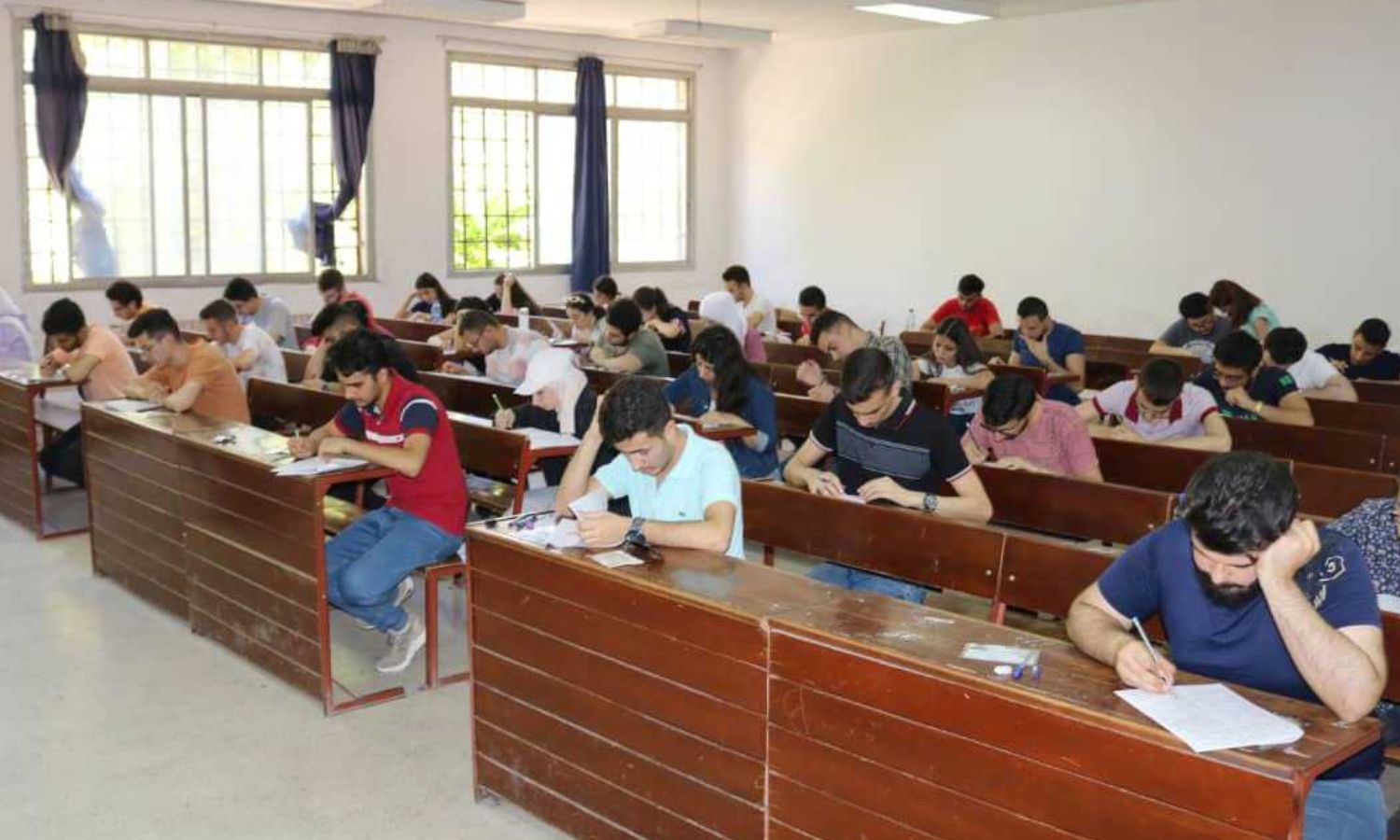



Homs – Orwah al-Mundhir
University exams began in regime-controlled areas in early July amid a sharp decline in the level of service, which is reflected in the various aspects of student life.
Long power outages and the return of the transportation crisis between the governorates and internal transportation in the same governorate all of which doubled the burdens on students.
The prices of written lectures and printing costs have doubled, with the Syrian pound crossing the barrier of 10,000 pounds against $1.
Although students have resorted to university housing over the years, the lack of services and the deterioration of the housing situation are among the factors that removed it from the students’ accounts, which exacerbated the examination burdens and reinforced the difficulty of passing exams successfully for some students.
Regime-controlled areas suffer from a chronic transportation crisis, which increases with the start of university exams every year due to the crowding of students taking exams simultaneously, forcing students to travel from their places of residence to universities a day before the exam date.
Khaled al-Ahmad, from Homs, studying at the Faculty of Architecture at the University of Damascus, told Enab Baladi that he is forced to travel to Damascus at least a day before the exam date, and he is also forced to travel by standing in the bus due to the lack of buses between the provinces.
The young man is forced to stay overnight with his relatives or in a hotel that costs at least 75,000 Syrian pounds. The aim is to ensure that he arrives at the exam on time, which is reflected in an exorbitant increase in tuition costs.
In front of the advantage of its proximity to the buildings of university colleges, public university housing lacks basic services in general, in addition to the deteriorating condition of the buildings and what the student gets at the beginning of the academic year of old and dilapidated furniture, after signing a written pledge to return it at the end of the year.
In addition to this type of problem, the state of electricity in regime-controlled areas affected university housing and the ability of students to study due to the long hours of power cuts that they face on a daily basis.
Manaf al-Ezzo, a dental student based in the Hama University campus, told Enab Baladi that the electrical supply has declined this year and that the university housing is now treated like a normal residential neighborhood, with slight differences in the number of feeding hours that do not exceed six hours every 24 hours.
Al-Ezzo added that the power outage was accompanied by an interruption in drinking water since the pumps run on electricity, which exacerbated the situation in university housing compared to last year and made students from nearby governorates prefer to live with their families and relatives and dispense with university housing.
The student indicated that the services in the past year were better compared to the current year, as the hours of power cuts did not exceed five hours a day, and the water was not cut off due to the almost permanent availability of electricity.
The prices of paper lectures have increased significantly with a continuous decline in the value of the Syrian pound against the US dollar, as the fee for printing one paper has increased from 100 SYP to 175 SYP per sheet, which has increased the material burden on students, given that the course is mostly issued through separate lectures, or an entire course may be an unavailable book that is printed in the same way.
Suha al-Mahmoud, a student at Al-Baath University, told Enab Baladi that the price of the course, which was 10,000, exceeded the price of 17,500 pounds, and this increase occurred with the beginning of the exams, to increase the tuition costs for students, according to her opinion.
A contractor for one of the university libraries at Al-Baath University, who refused to reveal his name for security considerations, told Enab Baladi that the depreciation of the pound caused an increase in the prices of printing papers as the price of paper rose nearly double, and the costs of maintaining printers and their spare parts rose with the devaluation of the currency, which prompted an increase in wages in order to cover the increase, explaining that the profit margin was not affected much despite the price hike.
Mohamad Turko, Vice President of Damascus University for Administrative Affairs, announced in December 2022 the start of the implementation of the electronic library project and the provision of electronic university books in more than 20 faculties of the university, along with institutes.
Turko claimed that the step aims to “reduce costs for the student,” reduce the market for abstracts and trading in “notebooks” that are spread in the kiosks, and contribute to the delivery of scientific material to students as quickly as possible in addition to saving printing and paper costs, due to the presence of large quantities of books stored and unsold. However, the project was not circulated to all public universities.
if you think the article contain wrong information or you have additional details Send Correction